Your Democratic primary cheat sheet: In the run-up to Iowa, who's still in the race?
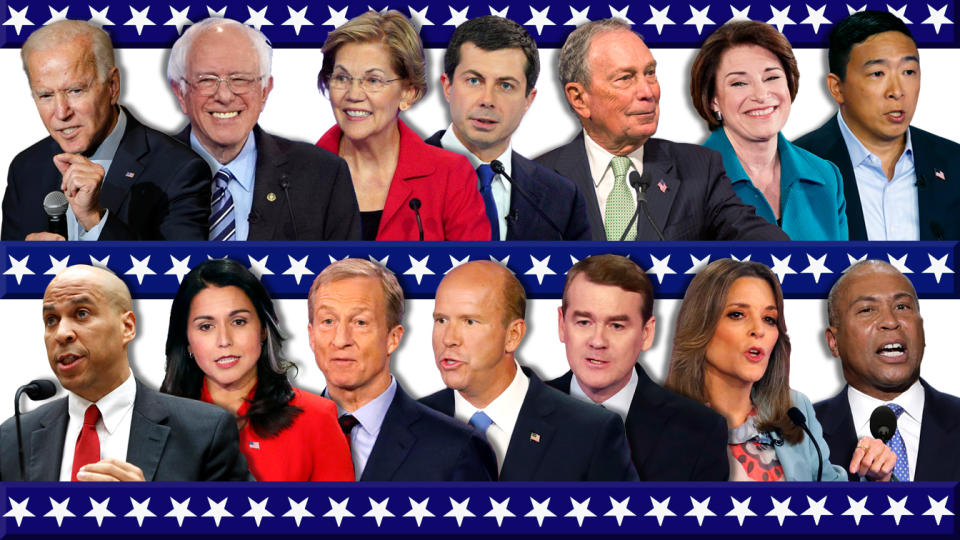
On July 28, 2017, former Maryland Rep. John Delaney announced he was running for the Democratic presidential nomination. In the ensuing 17 months, over two dozen candidates followed suit. After a 2019 full of campaign launches, debates, rallies, town halls and withdrawal announcements, just 14 remain in the race to oust President Trump in November.
Although overshadowed in the past month by impeachment news, the Democratic primary has continued, with regular debates, campaign appearances and fundraising updates. With four weeks to go until the first votes are cast in the Iowa caucuses, and 57 before the make-or-break Super Tuesday voting, here is where the remaining candidates stand, in order of their RealClearPolitics national polling average. A caveat: Not many polls were released over the holidays, and these numbers can be expected to change once results come in from Iowa, New Hampshire and the other early primary states.
Former Vice President Joe Biden
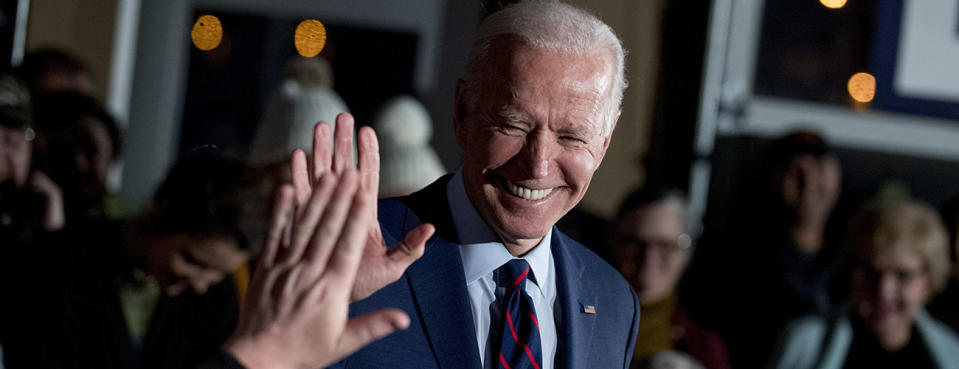
The two-term vice president under Barack Obama led in national polling before he even entered the race and has maintained his lead for most of 2019. Biden’s main pitch is based on his electability and his promise of returning the country to the less polarized and confrontational politics of the pre-Trump era. He has boasted of his ability to make deals with Republicans. But Sen. Kamala Harris, who has since exited the race, left Biden shaken in the first Democratic debate when she pointed out that his record of working across the aisle meant he was in league at times with unreconstructed segregationists. And Biden’s rivals call him naive for thinking a party that refused to work on anything with President Obama would cooperate with him on anything.
Biden’s polling lead is based on strong support from older Americans, particularly black voters. So far the 77-year-old’s campaign has survived a number of gaffes on the trail and attacks on his lengthy voting record, which includes support for strict crime legislation and the Iraq War. The former Delaware senator bounced back from poor fundraising numbers in the third quarter to close 2019 strong, but he also reneged on a promise to not take super-PAC money after concerns were raised by party insiders that he might lack the resources to carry the campaign into the convention and the general election. While Biden leads comfortably in most national polling, surveys in the first three primary states of Iowa, New Hampshire and Nevada show him trailing or with narrow leads. The favorite in the race until proven otherwise.
Sen. Bernie Sanders
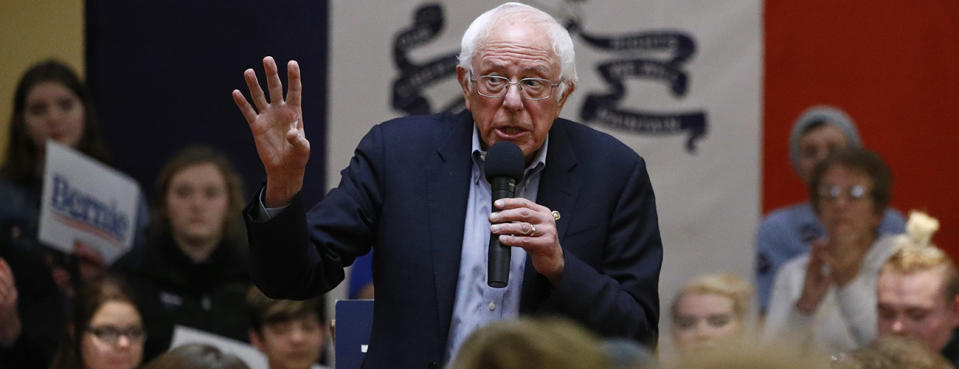
The 2016 primary runner-up’s second campaign for the presidency nearly ended in October when a heart attack temporarily knocked the 78-year-old off the trail. Since then, Sanders has rebounded, with a fundraising operation that’s about to hit its 5 millionth donation (no other campaign even has 3 million) and a diverse base of younger Americans, highlighted by the endorsements of Reps. Alexandria Ocasio-Cortez and Ilhan Omar. Sanders’s fourth-quarter fundraising haul of $34 million is the best of any Democrat in any quarter so far this race.
Contra Biden’s promise to take things back to how they were pre-Trump, Sanders’s message is a full-throated fight to build a working-class movement to change the system, from a single-payer health care plan to tuition-free college. Polling shows him within striking distance in the first three states, and with a massive fundraising base, money shouldn’t be a concern. Sanders will have to overcome hard feelings from many in the party about his 2016 run, but his campaign is counting on support from voters who don’t typically show up at the polls.
Sen. Elizabeth Warren

For much of 2019, Warren’s campaign was on a smooth rise, propelled by an outpouring of policy proposals and well-received town halls at which thousands of supporters lined up for selfies with her. A longtime critic of Wall Street, she has campaigned on her plans for reform of the financial industry, which brought one hedge fund magnate to tears over her lack of appreciation. (Her campaign then began selling “Billionaire Tears” mugs.) In October, she briefly overtook Biden in the national polling average, but since then has fallen back into third place, hurt by her struggles to explain her position on Medicare for All, which attempts to straddle the divide between centrists who think the proposal will hurt her in the general election, and progressives who think her phased approach is too timid.
To rebound, Warren needs to expand her appeal to minorities while keeping the support of the educated suburban voters.
Former Mayor Pete Buttigieg

The 37-year-old who served two terms as mayor of Indiana’s fourth-largest city has had perhaps the most surprising rise of 2019. Buttigieg began 2019 by accepting nearly any media availability offered to him, advertising his academic credentials and his military record in naval intelligence while offering a contrast to the septuagenarians who dominated the race. He became a favorite of Wall Street and Silicon Valley by pivoting to a more centrist message, but that — and his controversial high-ticket fundraiser in a much-ridiculed “wine cave” — has earned him the scorn of the left wing of the party. While Buttigieg has surged in Iowa and New Hampshire, his ceiling is limited by his poor showing among black voters, who in some polls give him zero percent.
Former Mayor Michael Bloomberg

The most recent entrant to the race, the three-term New York mayor immediately threw tens of millions — a small fraction of his $32 billion fortune — into the race to earn approximately 5 percent in national polling. That might be the ceiling for Bloomberg, who was first elected in 2001 as a Republican but who spoke at the 2016 Democratic National Convention and has supported a number of pro-gun-safety Democrats in recent elections. Polling in December showed him with low favorability ratings among primary voters. While Bloomberg has focused his campaign on issues of interest to the party (climate change, gun legislation), he’s also had to deal with pushback from minority voters over his stop-and-frisk policy as mayor and criticism for what some women have described as insensitive comments and a male-dominated culture at the financial-news company he founded. He has also elected to skip the early primary states, instead attempting to win some of the larger states and their corresponding delegate hauls later in the calendar.
Sen. Amy Klobuchar
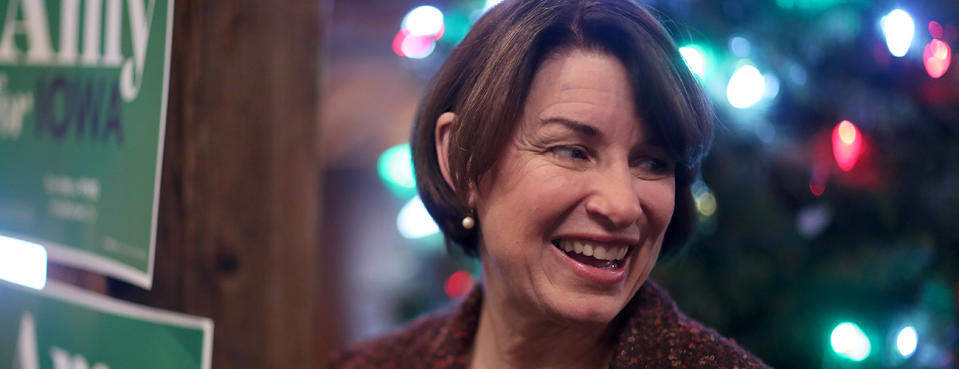
Klobuchar, a three-term senator from Minnesota, survived a rocky launch to her campaign, plagued by reports that she was abusive to her staff, to carve out a lane as a blunt, centrist truth-teller who has been successful in normally Republican-leaning rural parts of her state. While she has consistently turned in strong debate performances, she’s still stuck in the second tier of candidates, although one December poll had her at 10 percent in Iowa, Minnesota’s southern neighbor. But coming from a mostly white state, and with a background as a prosecutor, Klobuchar struggles to appeal to nonwhite voters.
Andrew Yang

If not for Buttigieg’s rise from nowhere to the top tier of candidates, Yang’s continued, if more modest, success would be the biggest surprise of the 2020 race. In his first foray into electoral politics, Yang has built his campaign around a form of universal basic income he calls the Freedom Dividend, which would give all Americans over the age of 18 $1,000 per month. His standing started to grow after an appearance on Joe Rogan’s podcast, and he remains extremely popular online, serving as the inspiration for scores of memes from his “Yang Gang” of supporters, converting that intensity into qualifications for every debate so far (while wearing a MATH pin, which stands for “Make America Think Harder”). He had an impressive $16.5 million fourth-quarter fundraising haul.
Sen. Cory Booker

Booker, one of two remaining African-American candidates in the race along with former Massachusetts Gov. Deval Patrick, failed to qualify for the most recent debate and is considered to be struggling to raise enough money to stay in the race. (Booker’s campaign said in September that if the candidate couldn’t raise $1.7 million before October, he’d drop out. The call for money worked.) Booker’s message of love and unity mixed with some broad policy proposals, including a criminal justice overhaul, has failed to earn him more than a percentage or two in the polls for months.
Rep. Tulsi Gabbard

Gabbard’s campaign appeared to be flagging prior to accusations from 2016 nominee Hillary Clinton in October that the congresswoman was potentially being groomed for a third-party run by Russia, which resulted in media attention she wasn’t otherwise getting. She was criticized by a number of Democrats for voting “present” on both articles of impeachment against Trump and failed to qualify for the most recent debate. Gabbard has already announced her retirement from Congress, although a former Democratic governor of the state has called for her to resign due to missing so many votes in the House.
Tom Steyer

After spending heavily on ads pushing Trump’s impeachment, the billionaire investor and climate activist entered the race in July 2019 and dumped tens of millions more on social media, seeking to enlist enough donors to qualify for the debates. It worked, but his appearances haven’t translated into more than minuscule levels of support in polls.
Former Rep. John Delaney

The pro-business Maryland Democrat was the first to enter the race and has spent millions of his own money in Iowa but failed to find traction after serving as a foil for the progressive candidates in the first two debates.
Sen. Michael Bennet

Despite a number of glowing profiles highlighting his résumé and centrist credentials, the senior senator from Colorado has thus far failed to gain any traction in polling or fundraising.
Marianne Williamson

The New Age lifestyle guru made a mark with her offbeat performances in the first two debates but despite the efforts of some Republicans to promote her candidacy barely registered in the polls. On Jan. 2, she laid off her entire campaign staff but said she was staying in the race.
Former Gov. Deval Patrick
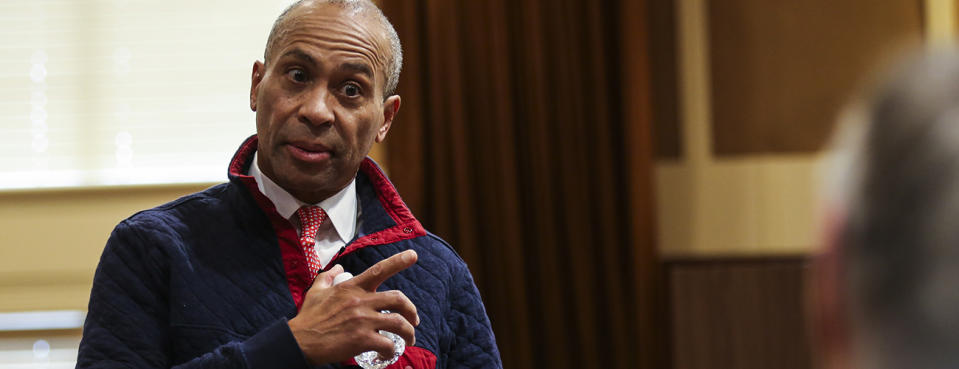
The two-term governor and Bain Capital managing director entered the race in November 2019 and hasn’t made a mark, although he is expanding staff in New Hampshire as those close to him cite the need for some “magic” to make up for the late start.
_____
The departed of note
Sen. Kamala Harris, California
Former Rep. Beto O’Rourke, Texas
Gov. Jay Inslee, Washington
Julián Castro, former housing secretary
For a brief period last spring, Harris and O’Rourke were running third and fourth in national polling. O’Rourke faltered first, with the nontraditional campaign style that almost fueled an upset in his 2018 Senate campaign failing to gain traction at the national level. Harris couldn’t capitalize on a bump after the first debate, unable to crack Biden’s hold on black voters amid criticisms of her record as a prosecutor and her inconsistent positions on health care. O’Rourke and Harris dropped out in late 2019, on Nov. 1 and Dec. 3, respectively.
Inslee dropped out in August 2019, with anemic fundraising and poll numbers but plaudits for a campaign focused on climate change. Castro, the lone Hispanic candidate, announced he was leaving the race on Jan. 2 after a campaign in which he attempted to elevate issues like poverty and immigration. On Monday, Castro announced he was endorsing Warren, fueling speculation he’s interested in being her vice presidential pick.
Miscellaneous
The number to know: 15. This is the percentage Democratic candidates need to hit to win delegates in the primary elections. This applies both at the state level and district level, so even if a candidate finishes with 13 percent of a state’s total vote, they could still earn some delegates by exceeding 15 percent in individual districts.
Superdelegates? Superdelegates are Democratic officials, roughly 700 in total, who each receive one vote in the nomination process. Per agreements reached following the 2016 primary, this time around the superdelegates do not get to vote on the first ballot at the convention this summer unless a candidate has already reached the necessary threshold via pledged delegates. The new rules were passed in 2018 after a push from Sanders supporters to strip some power from party insiders.
Dates to know:
Monday, Feb. 3: Iowa caucuses
Tuesday, Feb. 11: New Hampshire primary
Saturday, Feb. 22: Nevada caucuses
Saturday, Feb. 29: South Carolina primary
Tuesday, March 3: Super Tuesday (14 states, including Texas and California)
_____
Read more from Yahoo News:




